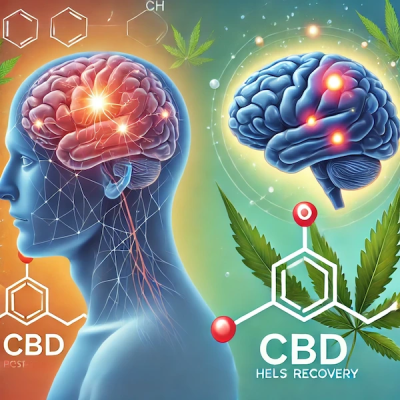How CBD helps with recovery after a stroke
Author: Lucie Garabasova
Stroke, clinically known as cerebrovascular accident (CVA), is a serious medical condition caused by a sudden disruption of blood flow to the brain. This disruption can damage brain cells and have long-term effects on both physical and mental health. Our experience with patients shows that CBD products can serve as an effective supplement in recovery after a stroke.
According to statistics from the World Health Organization, approximately 15 million people worldwide suffer a stroke each year, with one-third of them dying and another third left permanently disabled. This condition often requires immediate medical attention and long-term rehabilitation.
Symptoms of a stroke and what to do
Quick action at the first signs of a stroke can save lives and minimize damage. The most common symptoms include:
- Weakness or numbness on one side of the body.
- Speech difficulties, such as inability to speak or understand language.
- Drooping of one side of the mouth.
- Dizziness or loss of balance.
- Sudden, severe headache.
If you or someone around you notices these symptoms, call emergency services immediately (112 in Europe). Every minute counts.
Recovery after a stroke
Treatment and recovery after a stroke involve a combination of medications, rehabilitation, and lifestyle changes. Additionally, complementary methods can support the recovery process. One such option is using CBD products, which, according to patient experiences, positively influence recovery and overall quality of life.
Mrs. Alena’s Experience with CBD-assisted stroke recovery
We would like to share the story of Mrs. Alena, whose husband suffered a stroke. His condition was as follows: he could not express himself, struggled to understand spoken words, and experienced anxiety that was managed with antidepressants.
After consulting with a neurologist, Mrs. Alena turned to a cannabis advisory service in 2023, where the following products were recommended:
- CBD oil in fish oil: 5 ml twice daily.
- Hemp capsules: 1 capsule twice daily.
- Edestin (a hemp-based protein supplement).
In addition to products from Cannadorra, Hericium was also recommended.
Editorial note
During supplementation, dosages were gradually adjusted and later reduced, as the patient felt more fatigued. The above dosage reflects the final adjustments tailored to the patient's needs.
Positive changes observed
After starting the recommended CBD products, Mrs. Alena noticed the following improvements in her husband:
- Improved understanding: He better comprehends spoken words and can respond to conversations, even without verbal participation.
- Enhanced mood: He is generally more alert and optimistic.
- Better physical condition: The skin on his legs, previously damaged by venous ulcers, became firmer and healthier.
- Reduction in fatty lumps: The largest lump on his abdomen shrank and softened.
- Antidepressant-free: After a year of using CBD products, antidepressants were gradually discontinued without worsening his mental state. This improvement is attributed to his enhanced understanding of his condition, reducing his anxiety.
- Improved digestion: The fish oil seemed to have a laxative effect, eliminating the need for Lactulose.
- Speech: While his speech has not returned, and expectations for its full recovery are low, he attempts to repeat words. Despite his speech limitations, the family has adapted well, focusing on his improved understanding.
Improved quality of life
Mrs. Alena’s husband gradually returned to his pre-stroke routines. He can watch TV programs, read short words, and enjoy hobbies like sports betting (he can independently open betting websites, read team names, check odds, and place bets!). His progress has brought joy to his family. His good mood and smile have returned, making interactions with children and grandchildren more comfortable and fulfilling.
How CBD can aid stroke recovery
CBD works on the endocannabinoid system (ECS), which regulates essential functions such as immune response, mood, pain, and neuroprotection. These properties make CBD beneficial for stroke recovery in several ways:
- Neuroprotection: CBD protects brain cells from damage caused by inflammation and oxidative stress, potentially reducing the extent of brain damage.
- Improved blood flow: CBD enhances blood circulation and supports vascular repair, critical for brain tissue recovery.
- Anti-inflammatory effects: Post-stroke inflammation can hinder recovery. CBD's anti-inflammatory properties help reduce such inflammation.
- Support for neurogenesis: CBD promotes the growth of new neurons and synapses, improving cognitive functions and learning.
- Mood regulation: By acting on serotonin receptors, CBD can enhance mood and reduce anxiety and depression, common among stroke survivors.
- Relief from spasticity: Many stroke patients experience muscle spasticity. CBD’s relaxing effects may help alleviate these symptoms.
Important disclaimer
CBD is recognized for its anti-inflammatory, neuroprotective, and regenerative properties. Studies suggest that CBD can help protect brain cells, improve vascular health, and support neuronal regeneration after damage.
Before starting CBD products, consult a doctor to assess their suitability for your specific medical condition.
Conclusion
Mrs. Alena’s story demonstrates that CBD can be an effective supplement in stroke recovery. Although this is an individual experience, its success suggests that CBD can enhance the quality of life for patients and their families.


